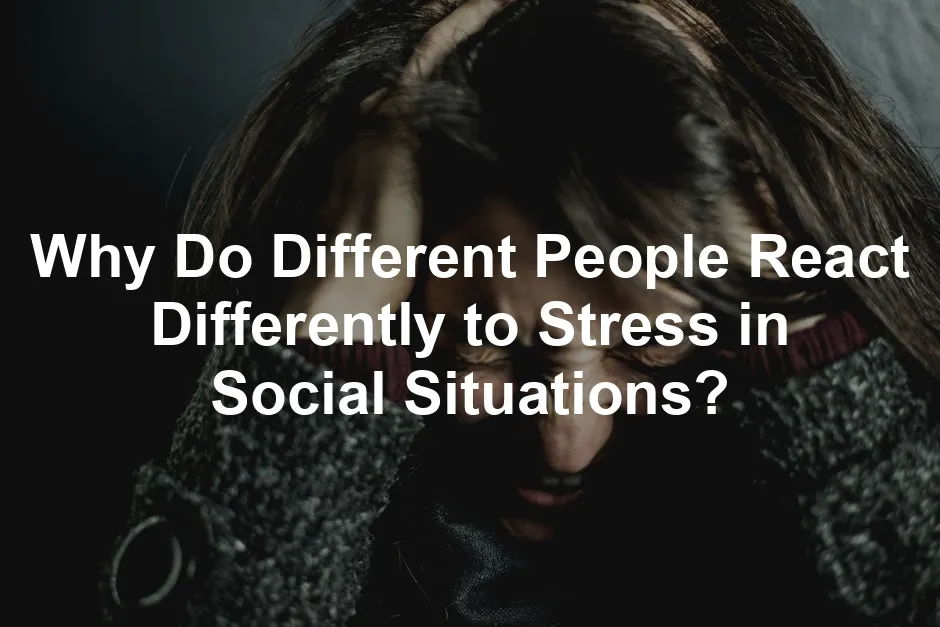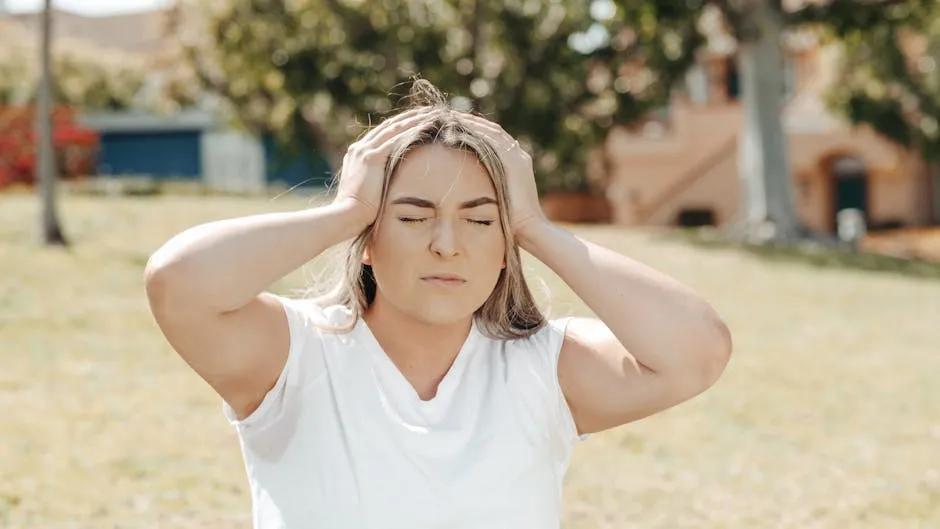
Why Do Different People React Differently to Stress in Social Situations?
Introduction
In today’s hyperconnected world, social situations can often feel like walking through a minefield of stress. What leaves one person unfazed can send another spiraling into anxiety. But why do these reactions vary so dramatically? Could it be our personality, past experiences, or something more intrinsic?
Understanding stress responses is key to navigating social dynamics. Some individuals thrive in bustling environments, while others wilt under pressure. This variability isn’t just about being shy or outgoing; it goes deeper. Psychological, neurological, and cultural factors play significant roles in how we experience stress.
Our personalities shape our perceptions and reactions. For instance, extroverts often seek out social interactions, viewing them as energizing. On the flip side, introverts may find the same situations overwhelming. Similarly, past experiences can color current reactions. Someone who faced ridicule in a group setting may feel anxious in similar scenarios later on.
Neurologically, our brains react differently to stress. The amygdala, for example, is our emotional alarm system. Variations in brain structure and function can lead to heightened sensitivity to social stressors in some people. This means that while one person may brush off an awkward encounter, another can experience a full-blown anxiety attack.
Culturally, backgrounds influence how we cope with stress. Some cultures encourage open emotional expression, while others may prioritize stoicism. This can affect how support is sought and received in stressful times.

By examining these multifaceted reasons behind varied responses, we can better understand not just our own stress reactions, but those of others too. Buckle up, because understanding stress is not just about surviving the moment but thriving in the chaos!
Summary of Key Points
This article will explore the reasons behind the differing reactions to stress in social situations, including:
- Psychological Factors: Personality traits, such as those outlined in the Big Five model, play a significant role in how we perceive and react to stress. Check out The Big Five Personality Traits for a deeper dive.
- Neurological Factors: Genetic predispositions and brain structures can influence emotional reactivity, affecting how stress is processed.
- Environmental Influences: Factors such as cultural background, life experiences, and current context shape our stress responses, sometimes leading to significantly different outcomes even in similar situations.
- Coping Mechanisms: Understanding how individuals cope with stress can reveal more about their personality and resilience. Consider exploring The Resilience Factor for insights.
- Social Dynamics: The role of social support and peer influence can either mitigate or exacerbate stress responses, creating a complex web of interactions that affect our emotional landscape.
By the end of this article, readers will gain a deeper understanding of the nuances of stress reactions and how empathy can play a pivotal role in navigating social dynamics.

The Science of Stress
Understanding Stress and Its Origins
Stress is a natural response to perceived threats. It involves both physiological and psychological components. Physiologically, stress triggers the release of hormones like cortisol and adrenaline. These hormones prepare the body for a “fight or flight” response. Psychologically, stress can lead to feelings of anxiety, irritability, or even depression.
From an evolutionary perspective, stress responses were essential for survival. Early humans faced immediate dangers, such as predators. Their bodies learned to react swiftly to protect them. Today, however, many stressors are less life-threatening. They can stem from work deadlines or social pressures, leading to chronic stress.
Stress can manifest in two forms: acute and chronic. Acute stress is short-term, often linked to specific events. Think of that moment when you spot your crush across the room! Chronic stress lingers over time, resulting from ongoing challenges, such as financial difficulties or toxic relationships. Chronic stress can harm health, affecting everything from the heart to the immune system. To help alleviate stress, consider using a Yoga for Stress Relief guide!

The Role of Control in Stress Reactions
Control plays a significant role in how we respond to stress. Studies show that individuals who feel in control of a situation experience less stress. In animal studies, rats exposed to shocks demonstrated this clearly. Rats that could control their environment by turning a wheel to avoid shocks showed fewer stress symptoms than those who couldn’t escape the shocks.
In humans, similar findings emerge. Research indicates that college students given tasks with controllable outcomes reported lower stress levels. When individuals have a sense of control, they can better predict the duration and severity of stress. This predictability helps mitigate stress’s negative impacts, leading to better emotional regulation and decision-making in challenging situations.

Psychological Factors Influencing Stress Responses
Personality Traits and Their Impact
Personality traits significantly shape how individuals react to stress. The Big Five personality model—comprising openness, conscientiousness, extraversion, agreeableness, and neuroticism—provides insight into these differences.
Extraverts, for instance, often thrive in social settings. They seek social support when stressed, turning to friends for comfort. Conversely, introverts may withdraw, finding solace in solitude. Their responses can lead to different stress management strategies.
Neuroticism, characterized by emotional instability, often correlates with heightened stress reactions. Individuals high in neuroticism may perceive situations as more threatening, leading to anxiety. In contrast, those high in agreeableness often approach stress with a cooperative spirit, seeking harmony in their social interactions.
For example, an extravert facing a stressful presentation might rally friends for support. An introvert, however, might prefer to prepare alone, feeling overwhelmed by the thought of an audience. These personality traits influence not only how stress is perceived but also how individuals cope. Understanding these dynamics can provide valuable insights into stress management and emotional resilience.

Family Background and Chronic Anxiety
Family background plays a crucial role in shaping how individuals react to stress. When we look at the roots of chronic anxiety, it often stems from familial environments. Children raised in homes where anxiety is prevalent may absorb these emotional patterns. This creates a learned behavior that can influence their stress responses later in life.
Research indicates that children of anxious parents often adopt similar patterns of emotional regulation. For instance, a study highlighted that these children might internalize anxious behaviors, leading to difficulties in managing stress as adults. They might perceive everyday situations as threatening, triggering heightened stress responses.
On the flip side, individuals from more stable backgrounds may develop better coping mechanisms. They often have a solid foundation for emotional regulation, allowing them to navigate stress more effectively. This variance illustrates how family dynamics can set the stage for lifelong patterns of stress response.

Neurological Influences on Stress Responses
Genetic Factors and Brain Structure
Our genetic makeup can predispose us to different reactions to stress. The serotonin transporter gene, for example, has been linked to emotional regulation. Individuals with certain variants of this gene tend to have heightened amygdala activity, which is vital for processing emotions and stress responses. When faced with social stress, these individuals might react more intensely than others.
The amygdala acts like a smoke alarm for emotions, signaling when something is off or threatening. Research shows that people with larger or more reactive amygdalae often demonstrate stronger emotional reactions. This can lead to a tendency to perceive social situations as more stressful, causing an exaggerated response.

Neurotransmitter Systems
Neurotransmitter systems also play a pivotal role in how we react to stress. Variations in serotonin and dopamine levels can affect mood and emotional responses. For instance, low serotonin levels are often linked to increased anxiety and depression. This imbalance can make stressful social interactions feel overwhelming. To combat this, consider using The Anxiety and Phobia Workbook for tools to manage anxiety effectively.
Conversely, higher dopamine levels can enhance mood and resilience, allowing individuals to tackle stress more effectively. Individuals with optimal neurotransmitter function may find social situations energizing rather than draining.
Understanding these neurological influences helps explain the complex tapestry of stress responses. Each person’s unique genetic and biochemical makeup contributes to how they handle social stressors, showcasing the intricate interplay between biology and behavior.

Environmental and Cultural Influences
The Impact of Life Experiences
Life experiences shape our stress responses like a sculptor with clay. Past traumas can leave lasting impressions, influencing how we react in social settings. For example, someone who faced bullying may find themselves anxious in groups. This is not just a coincidence; it’s a learned behavior. Each awkward encounter or hurtful comment adds a layer to their stress response.
Resilience, however, is the silver lining. It’s the ability to bounce back from adversity. Some people develop resilience through exposure to challenges. They learn to navigate social minefields with grace. Others may struggle to build this resilience, leading to heightened sensitivity to stress.
Interestingly, resilience isn’t fixed. It can develop over time. Engaging in supportive relationships, seeking therapy, or simply learning from experiences can enhance one’s ability to cope with stress. The more we experience, the better we can handle future challenges. Think of it as building a muscle; the more you work it, the stronger it gets!

To help build that resilience, consider using a Mindfulness for Beginners guide, which is designed to help you reclaim the present moment—and your life!
Cultural Contexts and Social Support
Culture is a powerful lens through which we perceive stress. Different backgrounds can influence how stress is viewed and managed. For instance, in collectivist cultures, social support is a communal affair. People rely heavily on family and community for emotional backing. Here, sharing stress is a way to lighten the load.
Conversely, in individualistic cultures, self-reliance is often emphasized. People may feel pressured to handle their stress alone, leading to increased feelings of isolation. This can exacerbate stress responses. For example, a person in the U.S. might avoid discussing their anxiety, while someone in Japan may openly seek support from friends and family.
Social support dynamics also vary across cultures. In some cultures, expressing emotions is encouraged, while in others, it might be seen as a weakness. This can shape how individuals manage stress. A study highlighted that esteem-building support can lead to increased stress for some cultural groups while providing comfort for others. This illustrates the importance of understanding cultural context in stress management.

Coping Strategies for Different Stress Responses
Adaptive versus Maladaptive Coping Mechanisms
Coping strategies can be broadly categorized into two types: adaptive and maladaptive. Adaptive strategies are healthy approaches that help individuals manage stress effectively. These include seeking social support, practicing mindfulness, or engaging in physical activities. They promote emotional well-being and resilience. If you’re looking for a great way to practice mindfulness, consider trying out The Relaxation Response: A Practical Guide to Stress Management.
In contrast, maladaptive strategies can worsen stress. These might involve avoidance, substance abuse, or aggressive behaviors. While they may provide temporary relief, they often lead to greater problems down the line. Understanding one’s stress response is crucial for developing healthier coping mechanisms.
Recognizing your stress triggers allows you to choose appropriate coping strategies. For instance, if social situations cause anxiety, practicing deep breathing or positive visualization can help. By tailoring strategies to individual responses, people can improve their ability to manage stress effectively.

The Importance of Social Support
Social support is like a cozy blanket on a chilly day. It wraps us in warmth and comfort when stress knocks at our door. When we face stressful social situations, having strong social connections can make all the difference. Studies show that individuals with robust support networks experience lower levels of stress. Friends, family, or even pets can provide that much-needed emotional refuge.
But how do we cultivate this valuable social support? First, be proactive! Engage with people around you. Host a game night or join a local club. These activities can help foster connections.
Another technique is open communication. Expressing your feelings can strengthen bonds. When you share your thoughts, you deepen relationships and create a supportive environment. Remember, vulnerability is not a weakness; it’s a strength!
Then there’s the art of active listening. When friends share their burdens, lend an ear. Sometimes, just being present can be more comforting than offering solutions. This practice nurtures empathy, making everyone feel valued and understood.
Finally, don’t forget to reciprocate the support you receive. Relationships thrive on give and take. Offer help when others need it, and soon, you’ll find your network growing. By fostering social connections, we build resilience in stressful situations. Together, we can face the challenges life throws our way, armed with the power of friendship and understanding.

So, the next time stress rears its head, remember: a solid support system is your best ally. Embrace it, nurture it, and watch how it transforms your experience in social settings. And if you’re looking to enhance your environment, consider adding some Desk Plant for Improved Mood to brighten your space!
Understanding how to manage stress is crucial for mental health. Explore the significance of coping strategies that can help individuals handle anxiety effectively.
Please let us know what you think about our content by leaving a comment down below!
Thank you for reading till here 🙂
All images from Pexels




